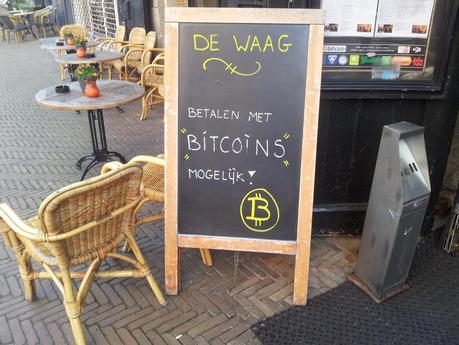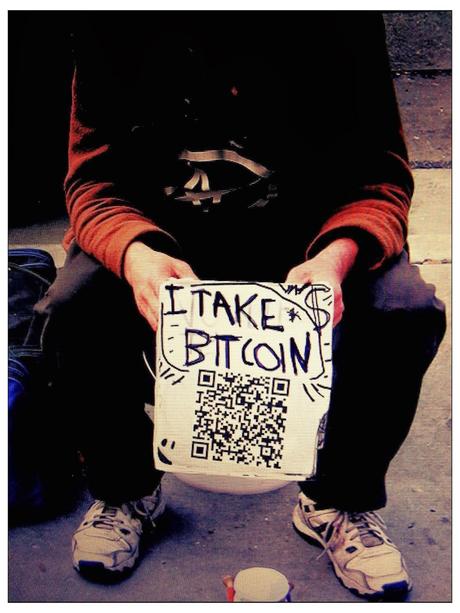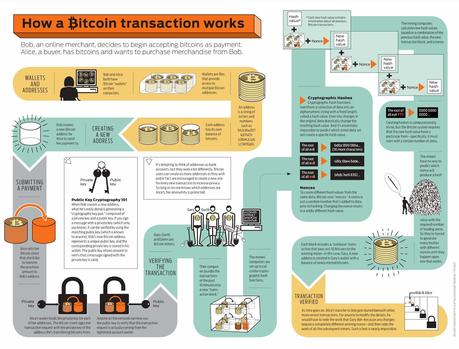
Would You Like a Coffee? It's Possible to Pay with Bitcoins
The following explanation of Bitcoin is taken from Wiki.Bitcoin is a decentralized digital currency created by developer Satoshi Nakamoto. It does not rely on a central server to process transactions or store funds. There are a maximum of 2,100,000,000,000,000 Bitcoin elements (called satoshis), currently most commonly measured in units of 100,000,000 known as BTC.As of April 2013, it is the most widely used alternative currency, now with the total market cap over 11 billion US dollarsBitcoin has no central issuer; instead, the peer-to-peer network regulates Bitcoins, transactions (see diagram at the end of this post) and issuance according to consensus in network software. Bitcoins are issued to various nodes that verify transactions through computing power; it is established that there will be a limited and scheduled release of no more than 21 million BTC worth of coins, which will be fully issued by the year 2140.Internationally, Bitcoins can be exchanged and managed through various websites and software along with physical banknotes and coins.
Bitcoin enables instant payments to anyone, anywhere in the world, using peer-to-peer technology to operate with no central authority: managing transactions and issuing money are carried out collectively by the network.

An Open Letter to Peter Schiff A follow-up to the discussion on the Peter Schiff Show, December 2, 2013 (this has been emailed to Peter just now)Dear Peter,It was a privilege and an honor to be a guest on your radio show today. I’ve been a fan of yours for more than five years; you were one of the reasons I discovered Austrian economics (and, in turn, Bitcoin), and your eloquent explanation of consumption vs. production in an economy has guided my outlook of the world ever since. So thank you sincerely for what you’ve taught me, and for the opportunity to appear on your show. It was a really special moment for me.While we had some valuable discussion today, I felt a follow-up was appropriate to better articulate my points. You’re right to be highly skeptical of such a new technology and monetary system, but please take the time to ensure your skepticism doesn’t blind you from what I humbly suggest is one of the most important tools for human freedom ever conceived.The FundamentalsFirst, Bitcoin must always be considered as two things: the payment network (Bitcoin) and the currency units (bitcoins). Condemnations of the latter can often be resolved with an understanding of the former. Satoshi should have named them differently to avoid this initial confusion.When you suggest that bitcoins have “zero intrinsic value,” you are only considering the currency unit itself and ignoring the payment network. While I prefer the term “utility” over “intrinsic value” (because all value is subjective to the valuer), I may indeed admit that bitcoins, as currency units all by themselves, have no fundamental utility and are completely uninteresting. But – and this absolutely critical – the payment network has vast utility.In fact, this network is probably one of the most valuable and consequential technologies currently on the planet. Some of us realized this a few years ago. Others are realizing it now. Many more will realize it in the future. The Bitcoin network is, fundamentally, a ledger of title controlled by no man. Ponder that for a moment. The transmission of value and ownership has thus just been severed from the State, not by impotent voting, but by the technological achievement of man.Now, during the show, you agreed that perhaps this payment network has utility. So, if the network (Bitcoin) has utility, and only one currency is accepted on this network (bitcoins), and those bitcoins are scarce, then should not those units themselves command a market price? Who knows what that price should be, but there should be a price, no?Any good that is useful and scarce will have a price (consider that air is useful but not scarce, and fish with three eyes are scarce but not useful, thus no price for either of them). Because the Bitcoin network is useful, and because only scarce bitcoin currency units are permitted on this network, the bitcoins themselves have a price. Indeed, they must have a price until the network is no longer useful, or the coins are no longer scarce.This is not magic. It is not a Ponzi scheme or elaborate fraud. It’s just the market pricing something that it finds useful. As the network grows in usage, its utility subsequently grows, and thus scarce bitcoins appreciate further. Those who grabbed coins in the early days benefit hugely, just as those prospectors grabbing nuggets of gold out of the California foot hills did in the early days of the gold rush. Gold is not a pyramid scheme merely because early acquirers profit from later subsequent adoption and demand.The Utility of Bitcoin and CompetitorsSo to adequately claim that bitcoins ought to have no price (which is the implicit assumption from your claim on national television that Bitcoin is a Ponzi scheme), you must demonstrate that the Bitcoin network has no utility. As someone who has transferred $100,000 worth of value to another person instantly in another country (on a Sunday when banks were closed, no less), I am confident that you will not succeed in this demonstration.I believe that you will understand and agree with my above arguments if you objectively ponder them for a while. Your contention then moves to the following: that if Bitcoin (the network) can be replicated by anyone, it isn’t actually scarce at all and thus even though the network is valuable, the price of individual coins will fall toward zero as the system is replicated over and over by competitors. You would explain that while bitcoins are limited to 21 million units, anyone can create a competing crypto-currency and thus the number of possible crypto-currency units are unlimited, thus not scarce, and thus not fundamentally worth anything.You made this argument several times on the show today. It is a fair point for you to raise, but please allow me to counter it.Bitcoin, after all, cannot really be copied. True, the open-source code can be copied and the copier could release CopyCoin (indeed this is happening all the time). But, the copier cannot copy the infrastructure. The protocol layer is easily copied. The infrastructure layer is not. On Day 1 of Bitcoin, it had no infrastructure layer. I can tell you, as an entrepreneur in this space for the past few years, Bitcoin’s infrastructure layer is now substantial. Indeed, I am sitting in my office, and looking at my employees building this very infrastructure as I write this. Their work, and that of many thousands of others around the world, is not so easily replicated.Let’s use an analogy, which you so often convincingly do when describing the absurdity of Fed policy or the counter-productive nature of various government programs. I believe the following is a very fair analogy.Consider that language itself is a protocol – a set of rules for conveying information. Consider then that one could copy the English language, and change parts of it, and release it as English 2.0. However, why would anyone use it? Even if it had marginal improvements over traditional English, where is the infrastructure? Where are the vast tomes of literature written in English 2.0? Where are the speakers and writers and scholars of this new language? Where are the libraries and Wikipedias full of English 2.0 articles? How many newspapers are written and conveyed in English 2.0? How many Peter Schiff podcasts are disseminated in this new alternative? That infrastructure wouldn’t exist, and neither therefore, would the users. This is merely the natural, spontaneous consequence of network effect, and it applies to English as a protocol for language just as it applies to Bitcoin as a protocol for money.Now, does the network effect mean English, or Bitcoin, can never be replaced? No. But it does mean it’d be extremely difficult in either case.But let’s remember something. Even if a superior crypto-currency overcomes Bitcoin in the open market (certainly possible), does that make Bitcoin a failure or Ponzi scheme? Does that negate the utility bestowed by Bitcoin while the market still favors it? Consider that one can benefit from the Bitcoin network with zero or very low exposure to the currency price long term. This means a payment made with Bitcoin last year still accomplished its objective – value moved freely, the users benefited, even if a year later the system falls apart and goes to zero. Thus, there is real utility today even if the system doesn’t work next year. The assumption that Bitcoin will be around for eternity is not a prerequisite for benefiting from its utility in the present.Mutual Respect for Market-Based MoneyI think you will discover, upon reflection, that your concerns about Bitcoin boil down to the thesis that Bitcoin is a volatile, highly speculative, and non-conservative asset class. In this, I wholeheartedly agree. But if your arguments are claiming that the payment network itself is some kind of fraud – a Ponzi scheme undeserved of respect or even consideration – then I must take issue with that. The Bitcoin network is an utterly revolutionary technology. It separates money from the state, in a way that gold, unfortunately, has been unable to do.When fully understood, Bitcoin should bring tears to the eyes of anyone who fights against the tyranny and ignorance of coercive governments and their monetary witch doctors. This is why thousands of people around the world have dedicated their lives to this campaign. We are carrying out this experiment without anyone’s permission. We’ll either fail, or change the world in a way that was inconceivable before this technology existed.I wholly support your idea to make a gold-backed digital currency. Please do it. I’d love to be your first customer, because I love gold. But being in this business, seeing how the payments and banking and regulatory world works, I can tell you that your initiative will likely fail, either by self-immolation (GoldMoney severing inter-account payments), or by governmental take down (e-gold).A monetary/payment system that relies on gold backing is reliant on the backer. It relies on a centralized, trusted party, to warehouse the gold and provide convertibility. This is the counter-party risk eliminated by Bitcoin.If there is a centralized backer for any payment system, then the system will have to follow all government laws, or be shut down. To follow the laws, personal customer information must be known, meaning privacy is impossible. Transfer limits and strict terms of use will be imposed, meaning financial freedom is impossible. And have fun with the compliance costs. Have you noticed international banks dropping American customers around the world? It is due to this unfortunate dynamic. And then, if the stars align, and the gold-backed currency manages to grow big and become a successful global payments network, it’s not unreasonable to assume that governments will take it down anyway, because it would compete with fiat – from which great swaths of their power originates.You cannot compete with fiat by having a competitor that is vulnerable to the guns of government. Bitcoin may not be perfectly immune, but it is highly resistant. Censorship of e-gold was easy. Censorship of Bitcoin will be… entertaining.Regardless, if you’re honestly interested in trying that experiment again, I will help you and support that effort, because I recognize the value of precious metals as commodities and as money. Until such a system actually exists, I am humbly asking you to support our efforts in kind, and am humbly suggesting to you that bitcoins, while non-physical, are indeed real and indeed have real value, because they are the one currency accepted on the most revolutionary payment network known to mankind. This is not theory – it’s actually working for millions of dollars of payments every day. We’ve moved beyond the Mises textbook. We’re running in the open market.While Bitcoin is still a highly-volatile experiment, it deserves more respect than dismissal as a Ponzi scheme, and regardless of whether you think the current price of a bitcoin unit is justified, you must acknowledge that this technology, broadly speaking, has utility both for both economic exchange and, more importantly, individual freedom.When my grandparents ask me how to protect their wealth, I don’t tell them to buy bitcoins. I tell them to buy precious metals. When they ask me how to transfer value across distance, I don’t tell them to ship gold. I tell them to use Bitcoin. My hope in writing this letter is simply this – that perhaps you’ll come to see Bitcoin and gold as beautiful compliments and important tools in the advancement of free-market money – one long-standing, conservative, and physical, the other new, technologically and politically disruptive, and digital. One will not replace the other, but I believe both will come to replace fiat, and good riddance to that stuff.In Liberty, Erik Voorhees

How a Bitcoin Transaction Works

